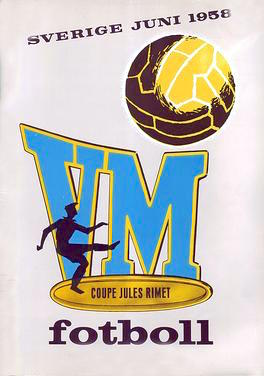
The 1958 FIFA World Cup was the sixth FIFA World Cup, a quadrennial football tournament for men's senior national teams. It was played in Sweden from 8 to 29 June 1958. It was the first FIFA World Cup to be played in a Nordic country.
A total of 37 teams entered the 1954 FIFA World Cup qualification rounds, competing for a total of 16 spots in the final tournament. Switzerland, as the hosts, and Uruguay, as the defending champions, qualified automatically, leaving 14 spots open for competition.
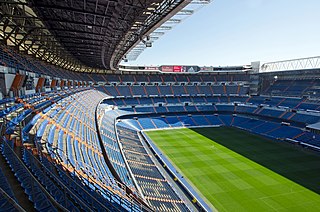
The 1979–80 season of the European Cup football club tournament was won by holders Nottingham Forest in the final against Hamburg. The winning goal was scored by John Robertson, who drilled the ball into the corner of the Hamburg net from outside the penalty area. Nottingham Forest remain the only side to have won the European Cup more times than their domestic top flight.

The 1980–81 European Cup was the 26th season of the European Cup football club tournament, and was won for a third time by Liverpool, who beat six-time champions Real Madrid in the final. In the 11 seasons up to and including this one, there were only four winners of the European Cup, but there were eleven different runners-up. This sequence was ended the following year, when Bayern Munich lost to first-time finalists Aston Villa.
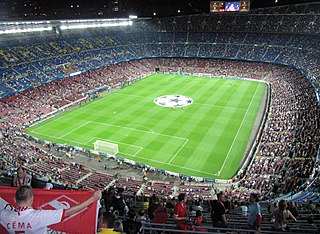
The 1988–89 European Cup was the 34th season of the European Cup football club tournament. The competition was won by Milan, the first time since 1969 and third time overall, comfortably defeated former winners Steaua București in the final.
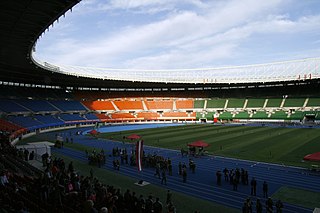
The 1989–90 European Cup was the 35th edition of Europe's premier club football tournament, the European Cup. The final was played at the Praterstadion in Vienna on 23 May 1990. The final was contested by Italian defending champions Milan and Portuguese two-time former winners Benfica. Milan successfully defended their title with a 1–0 victory, securing their fourth European Cup trophy. Milan remained the last team to successfully defend their trophy until Real Madrid did it again in 2017. Arsenal were denied a place in the competition, as this was the last year of a ban from European competitions for English clubs following the Heysel Stadium disaster of 1985.
The 1984–85 season of the European Cup Winners' Cup was won by Everton in the final against Rapid Wien.
The 1987–88 UEFA Cup was the 17th season of the UEFA Cup, the secondary club football competition organised by the Union of European Football Associations (UEFA). The final was played over two legs at the Estadi de Sarriá, Barcelona, Spain, and at Ulrich-Haberland Stadion, Leverkusen, Germany. The competition was won by Bayer Leverkusen of Germany, who defeated Español of Spain on penalty kicks with an aggregate result of 3–3.
The 1983–84 UEFA Cup was the 13th season of the UEFA Cup, the third-tier club football competition organised by the Union of European Football Associations (UEFA). The final was played over two legs at the Constant Vanden Stock Stadium, Brussels, Belgium, and at White Hart Lane, London, England. Tottenham Hotspur of England defeated title holders Anderlecht of Belgium, on penalties, after the final finished 2–2 on aggregate, to win the competition for the second time.

The 1975–76 UEFA Cup was the fifth season of the UEFA Cup, the third-tier club football competition organised by UEFA. The final was played over two legs at Anfield, Liverpool, England and at the Olympiastadion, Bruges, Belgium. It was won by Liverpool of England, who defeated Club Brugge of Belgium by an aggregate result of 4–3 to claim their second UEFA Cup title.
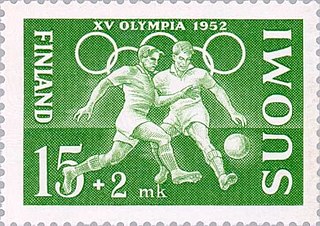
The Football tournament at the 1952 Summer Olympics was won by Hungary.
The three teams in this group played against each other on a home-and-away basis. France and Bulgaria finished level on points and advanced to a play-off on neutral ground to decide who would qualify. The winner (Bulgaria) qualified for the 1962 FIFA World Cup held in Chile.
The three teams in this group played against each other on a home-and-away basis. Sweden and Switzerland finished level on points and advanced to a play-off on neutral ground to decide who would qualify. The winner (Switzerland) qualified for the seventh FIFA World Cup held in Chile.
The 2002 FIFA World Cup qualification UEFA Group 9 was a UEFA qualifying group for the 2002 FIFA World Cup. The group comprised Albania, England, Finland, Germany and Greece.
The 1986 FIFA World Cup qualification UEFA Group 3 was a UEFA qualifying group for the 1986 FIFA World Cup. The group comprised England, Finland, Northern Ireland, Romania and Turkey.

The Soviet Union Olympic football team was the national Olympic football team of the Soviet Union from 1952 to 1992. The team participated in all of the qualification football tournaments for Summer Olympics. Until 1992, when age restrictions were officially introduced, the Soviet Union used the first team both in qualification tournaments and finals except for 1960 and 1964 when the second national team was used for the qualification tournaments.
The 1972–77 Nordic Football Championship was the eleventh Nordic Football Championship staged. Four Nordic countries participated: Denmark, Finland, Norway and Sweden. Sweden won the tournament, its ninth Nordic Championship win.
Group 1 consisted of five of the 34 teams entered into the European zone: Albania, Austria, Bulgaria, Finland, and West Germany. These five teams competed on a home-and-away basis for two of the 14 spots in the final tournament allocated to the European zone, with the group's winner and runner-up claiming those spots.
Group 1 consisted of four of the 32 teams entered into the European zone: Austria, Hungary, Malta, and Sweden. These four teams competed on a home-and-away basis for one of the 9,5 spots in the final tournament allocated to the European zone, with the group's winner claiming this spot.
Group 3 of the UEFA Euro 1968 qualifying tournament was one of the eight groups to decide which teams would qualify for the UEFA Euro 1968 finals tournament. Group 3 consisted of four teams: Soviet Union, Greece, Austria, and Finland, where they played against each other home-and-away in a round-robin format. The group winners were the Soviet Union, who finished 5 points above Greece.







